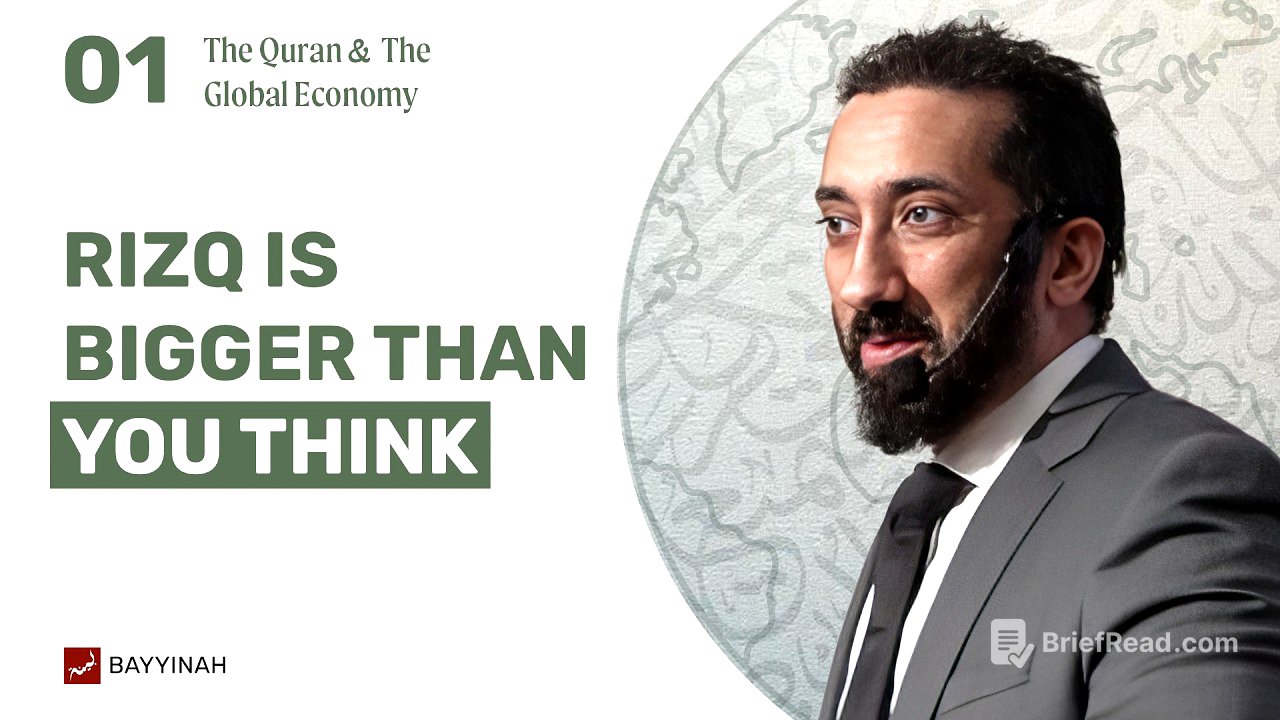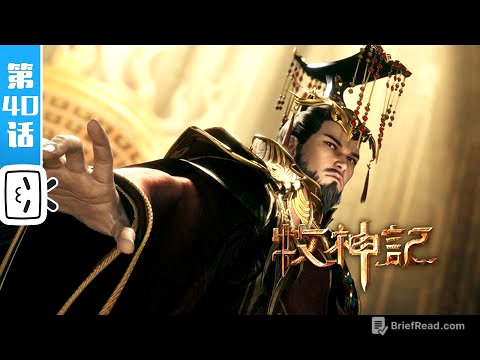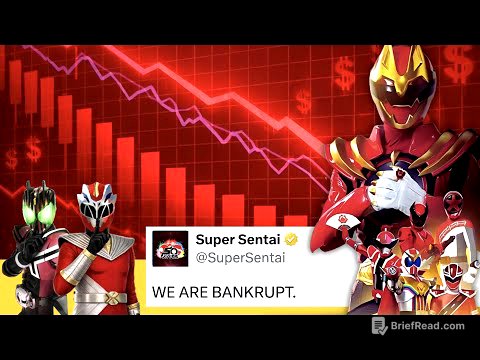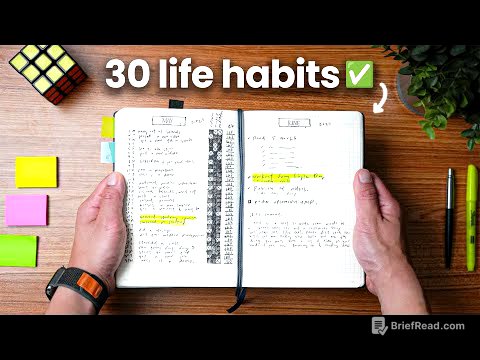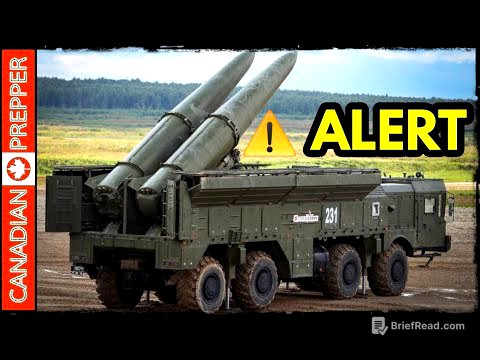TLDR;
This lecture explores the Quran's perspective on economics, challenging the separation of spiritual and material realms. It highlights how the Quran addresses natural resources, business development, and economic terms like "rizq" (provision), "fadl" (extra), and "mataa" (resources for utility and enjoyment). The lecture emphasizes that pursuing economic opportunities and engaging in trade are not contrary to Islamic principles but are integral to a balanced and prosperous life, as encouraged by the Quranic text and the examples of the prophets.
- The Quran provides guidance on economic matters, integrating them with spiritual life.
- Natural resources are blessings for sustenance and economic advantage.
- The pursuit of economic opportunities and trade is encouraged within ethical boundaries.
Introduction [2:06]
The speaker expresses gratitude to the audience and acknowledges the ambitious scope of the lecture, aiming to cover a significant amount of material in a short time. He anticipates that the lecture may be dense and not purely entertaining, but hopes to provide valuable insights. He also mentions a prayer break scheduled in about half an hour. The core message is about understanding the Quran beyond just spiritual and ritualistic aspects, adding an economic lens to our understanding of the Holy Book.
Quran's Perspective [3:13]
The lecture addresses the common perception of religious texts, including the Quran, as primarily serving spiritual and ritual purposes. It argues that this view limits the comprehensive nature of the Quran, which also provides guidance on economic matters. The speaker notes that many Muslims may focus on theological concepts or jurisprudence while overlooking the Quran's instructions on areas like inheritance and divorce, leading to inconsistencies in their lives. The lecture aims to provide a lens through which to understand the Quran's perspective on economics, wealth, trade, and the flourishing of economies, bridging the perceived gap between "deen" (religion) and "dunya" (worldly affairs).
Natural Resources in the Quran [7:34]
The lecture explores how the Quran addresses natural resources, emphasizing their economic significance. It references verses about rain, produce, and animal consumption, highlighting that nations with abundant agricultural and meat resources have a significant economic advantage. The conflict between Russia and Ukraine is mentioned as an example of how disruptions in food supply chains can affect global economies. The speaker encourages listeners to consider the global economic impact of elements mentioned in the Quran, such as rain, and introduces "rizq" as a key economic term, encompassing both spiritual and material provisions.
Ships and Rivers [13:39]
The lecture emphasizes the importance of ships and rivers in global trade, noting that 90% of trade occurs through water pathways. It highlights that the Quran acknowledges these resources as essential for economic activity. The speaker transitions to discussing the term "fruit" in the Quran, explaining that it symbolizes investments and business development. The process of growing fruit, from initial investment to eventual profit, mirrors the growth and maturity of business ventures.
Key Economic Terms in the Quran [16:42]
The lecture identifies and explains key economic terms in the Quran, including "fadl," which means extra or bonus, and is used to describe business opportunities and financial gains. It references a verse about people traveling to pursue the "fadl" of Allah, indicating the pursuit of business opportunities and investments. The lecture also addresses the idea that discouraging the pursuit of halal economic activities is akin to making permissible things impermissible, which the Quran discourages. The lecture uses the example of Hajj to illustrate that even during the most spiritual journey, pursuing economic opportunities is permissible and practical.
Stability and Resources [22:27]
The lecture references the story of Dhul-Qarnayn from Surah Al-Kahf, emphasizing the importance of stability for societies, businesses, and families. It connects market stability with political and national security, noting their interconnectedness. Dhul-Qarnayn's story illustrates the concept of reinvestment, using existing resources to pursue further development and build alliances. The lecture points out that Dhul-Qarnayn engaged in trade and partnerships with people of diverse backgrounds, suggesting that business expansion is not limited to partnerships with fellow believers.
Pursuing Higher Education [26:12]
The lecture addresses the growing trend of discouraging Muslims from pursuing higher education in fields like medicine, economics, or engineering, with some arguing that such pursuits are solely for worldly gain ("dunya"). It counters this view by highlighting a verse in the Quran that considers it a miraculous sign that people send their children on ships to explore new economic opportunities and learn tradecraft. The lecture argues that these pursuits are blessed and that the Quran supports seeking better futures for coming generations through education and exploration.
Utility and Enjoyment [29:52]
The lecture introduces "mataa" as another economic term in the Quran, meaning resources for utility and enjoyment. It explains that "mataa" encompasses both the practical use of something and the pleasure derived from it, such as fruit providing nutrients and enjoyment. The lecture emphasizes that enjoyment drives industry and innovation, citing examples like user experience design in apps and the appeal of owning a nice car. It concludes by referencing a verse stating that there is no harm in entering commercial buildings for "mataa," suggesting that these places offer utility and resources to enjoy.
Global Outlook [33:42]
The lecture concludes by referencing Prophet Nuh (peace be upon him) encouraging his people to explore the world and seek new avenues, highlighting a global outlook even in ancient times. It emphasizes that travel and development require economic planning, suggesting that even early prophets recognized the importance of economic activity. The speaker previews the next episode, which will discuss the special status of business activity in Islam based on the understanding of the Sahaba (companions of the Prophet Muhammad).
